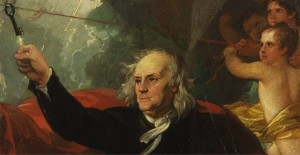 How did the Founding Fathers’ views about science, law, and philosophy influence their efforts to create “a more perfect union?” A panel of scholars will discuss this issue at a symposium, “Founding Science and the Making of a Modern Republic,” April 26 from 10:30 am – 2:30 pm in the Hermann Hall Ballroom. Attendees may come to the morning or afternoon sessions, or both.
How did the Founding Fathers’ views about science, law, and philosophy influence their efforts to create “a more perfect union?” A panel of scholars will discuss this issue at a symposium, “Founding Science and the Making of a Modern Republic,” April 26 from 10:30 am – 2:30 pm in the Hermann Hall Ballroom. Attendees may come to the morning or afternoon sessions, or both.
Please RSVP here.
This is the second event of the new Benjamin Franklin Project, offering IIT students and the community new opportunities to learn about the American founding.
Schedule
Session One – The Foundations of Our Modern World: Bacon and Descartes
10:30 am – noon
• “Francis Bacon and the Americans’ ‘New Order of the Ages,’” Ralph Lerner, Benjamin Franklin Professor Emeritus and Professor in the Committee on Social Thought, University of Chicago
• “Descartes’ Prescription for America,” Stuart Warner, associate professor of philosophy, Roosevelt University
• Russell Betts, Dean, IIT College of Science and Letters, moderator
Lunch Break
Noon – 1 pm
Session Two – From Foundational Science to Political and Cultural Foundations: Scientific Understanding and a New Political Science
1 pm – 2:30 pm
• “The Science of the Legislator: Experiment and Reform in 18th-Century Jurisprudence,” David Lieberman, Jefferson E. Peyser Professor of Law and Professor of History; Director, Kadish Center for Morality, Law and Public Affairs, University of California, Berkeley
• “Joseph Priestley: Scientific Knowledge and Public Enlightenment,” Jan Golinski, Professor of History and Humanities, Chair of the Department of History, University of New Hampshire.
• Harold Krent, Dean, IIT Chicago-Kent College of Law, moderator
“The Benjamin Franklin Project will allow students and scholars to explore the full range of the founders’ work—from their most practical domestic devices to the extraordinary ideas and architecture of the New Republic,” said Christena Nippert-Eng, chair of the Department of Social Sciences. “The project focuses especially on the Enlightenment and on the framers as scientists, inventors and designers in both the social and the natural realms, exploring how all these elements continue to spark imaginations and shape priorities in today’s highly interconnected world.”
The BFP will develop an optional curriculum that will guide students through primary core texts, providing them with a common body of reading and instruction in modern Western ideas. A postdoctoral fellow associated with the program will begin teaching in fall of 2012.
“The relationship between new understandings of law and new approaches to science was key for the Framers. The exploration of that relationship is the driving question of the Benjamin Franklin Project,” said Pamela Edwards, director of academic initiatives at the Jack Miller Center.
“This symposium will bring eminent historians of science, philosophers and scholars of politics and law together with the IIT community of students and faculty to explore these themes. The JMC is very excited about the possibilities of this event and very proud to support it.”
The Benjamin Franklin Project joins a network of JMC partner programs initiatives on 46 college campuses in the Chicago area and across the United States. Additional support is being provided by the Brinson Foundation, IIT’s College of Science and Letters and Department of Social Sciences, and JMC donor partners in the Chicago area.
